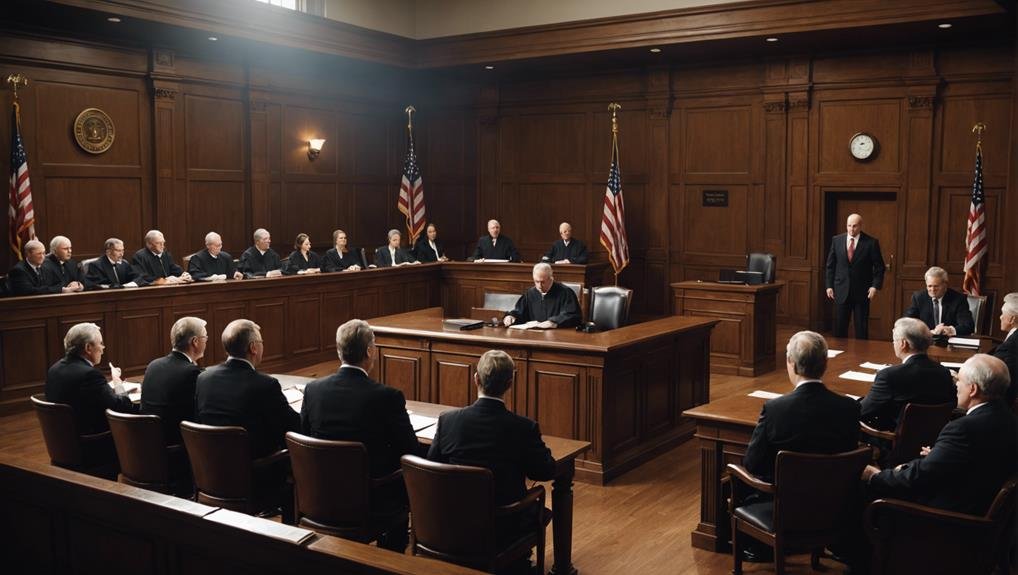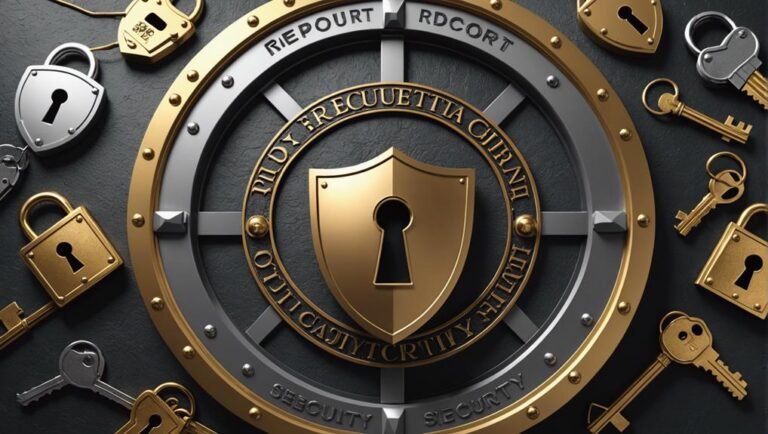Due Process Defined and How It Works, With Examples and Types
Due process, rooted in historical documents like the Magna Carta, guarantees fair legal treatment. It originated in the 13th century to prevent arbitrary laws by monarchs. Two types exist: procedural guarantees notice and a fair hearing, while substantive protects fundamental rights. Examples include eminent domain guaranteeing fair compensation. The Exclusionary Rule prevents unlawfully obtained evidence in court. Related concepts like the Sixth Amendment guarantee speedy trials. This fundamental concept safeguards against government actions, upholding justice.
Key Takeaways
- Due process ensures legal proceedings follow established rules and principles.
- Procedural due process includes a notice requirement and a neutral hearing.
- Substantive due process protects fundamental rights from government interference.
- Examples include property rights safeguarded through the Takings Clause.
- Exclusionary rule prohibits unlawfully obtained evidence in court proceedings.
Definition and Origin of Due Process
The concept of due process, originating from historical documents like the Magna Carta, mandates that legal proceedings adhere to established rules and principles, ensuring essential treatment in both civil and criminal matters.
Originating in the 13th century, due process evolved to prevent arbitrary changes to laws by the monarchy, aiming to safeguard individuals from government or state actors. It is now enshrined in the Fifth and Fourteenth Amendments in the U.S., influencing the legal landscape globally.
This evolution underscores the vital role due process plays in protecting individual rights and promoting fairness in legal proceedings. By tracing its origin and evolution, we gain a deeper understanding of how this fundamental concept has shaped modern legal systems worldwide.
Types and Components of Due Process
Analyzing the concept of due process reveals distinct types and essential components governing legal proceedings. Procedural due process mandates a notice requirement, guaranteeing individuals are informed of legal actions against them. It also necessitates a hearing where parties can present their case and a neutral decision-maker who is unbiased and impartial.
Substantive due process, on the other hand, protects fundamental rights from government intrusion, ensuring laws are not arbitrary or unreasonable. Courts play an important role in upholding due process by safeguarding individuals from vaguely written laws and incorporating the protections of the Bill of Rights.
These components work together to guarantee fairness, transparency, and justice in legal proceedings, maintaining the integrity of the legal system.
Examples and Applications of Due Process
Examining real-world scenarios where due process principles are applied provides practical insight into the protection of individual rights within legal frameworks.
In the context of eminent domain, where the government can take private property for public use, due process safeguards property rights. The Takings Clause in the Fifth Amendment guarantees that property cannot be seized without notice and fair compensation, emphasizing the significance of due process in protecting individuals from arbitrary government actions.
In eminent domain cases, property owners are entitled to receive fair market value payments for their properties, reflecting the principles of due process. Additionally, the Fourteenth Amendment extends these protections to state and local governments, reinforcing the application of due process in safeguarding property rights.
Due Process Exclusionary Rule
In legal proceedings, the exclusionary rule plays a pivotal role in safeguarding the integrity of evidence by prohibiting the use of unlawfully obtained information in court. This rule guarantees fairness and legality in court proceedings, upholding the integrity and legality of evidence presented. By preventing the use of evidence gathered through illegal means, such as unauthorized searches or seizures, the exclusionary rule protects individuals from violations of their due process rights. It serves as an essential mechanism to deter law enforcement misconduct and maintain the standards of justice within the legal system. Below is a table highlighting the impact and importance of the exclusionary rule in court proceedings:
| Impact of Exclusionary Rule | Importance in Court Proceedings | Safeguarding Due Process Rights |
|---|---|---|
| Prevents Use of Illegally Obtained Evidence | Ensures Fairness | Upholds Integrity of Evidence |
Related Legal Concepts and Historical Context
Building upon the foundation laid by the exclusionary rule in safeguarding evidence integrity within legal proceedings, a deeper exploration of related legal concepts and historical context reveals significant influences on the development of due process rights.
- Sixth Amendment: Guarantees the right to a speedy and public trial, an impartial jury, confrontation of witnesses, and legal counsel in criminal prosecutions.
- Eminent Domain: Allows the government to take private property for public use, rooted in the Takings Clause of the Fifth Amendment.
- Exclusionary Rule: Prevents illegally obtained evidence from being used in court, aiming to deter law enforcement misconduct.
These concepts, along with historical documents like the Magna Carta, have played integral roles in shaping the landscape of due process rights and legal protections throughout history.
Conclusion
To summarize, due process is a foundational principle in legal systems worldwide, ensuring fair treatment and protecting individuals' rights. By examining its types, components, and real-world applications, the significance of due process in upholding justice becomes evident.
The exclusionary rule, which excludes illegally obtained evidence from court proceedings, further highlights the importance of adhering to due process. Through its procedural and substantive elements, due process serves as a crucial safeguard against governmental overreach and arbitrary actions.







